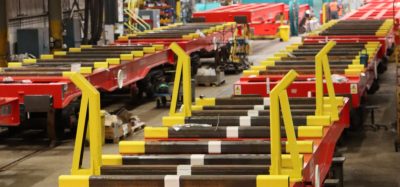Reforming rail in Belarus would boost the economy, says World Bank
Posted: 25 February 2019 | Global Railway Review | 1 comment
A study has suggested Belarusian Railways undertakes analyses of freight and passenger markets, investment needs and the organisational structure.


Passenger carriages operated by Belarusian Railways
A new World Bank Railway and Logistics Sector Study for Belarus has been published, highlighting how organisational restructuring, tariff reforms and strategic use of digital technologies would boost the competitiveness of the Belarusian railway sector: Improving rail passenger experience and contributing more to the economy.
Over the last decade, the railway sector’s share of traffic in Belarus has fallen from 35 per cent to 29 per cent, a decline which is thought to have been largely caused by increased competition from road transport, combined with challenges in the railway sector’s organisational structure and tariff policies.
“Belarusian Railways isn’t a company in the conventional sense – it’s a public association that supervises 29 different state-owned legal entities, each with its own balance sheet, statement of accounts and assets, and decision-making processes,” said Alex Kremer, World Bank Country Manager for Belarus. “Consolidating all these entities into a single state-owned enterprise would help improve the sector’s overall management and competitiveness.”
The study recommends a new strategy for Belarusian Railways that includes a revaluation of assets, changes to accounting practices and development of commercial strategies and business plans both for freight and passenger units. Alongside this there is a call for the strategic use of digital technologies to improve customer service, increase operational efficiency and support infrastructure management.
Currently in Belarus, most rail prices are regulated by the state. While international passenger tariffs have increased, regional and local passenger service tariffs have declined considerably, compared with inflation and earnings. Due to this, Belarusian Railways has had to cross-subsidise passenger services by charging higher tariffs on its freight business, which adversely impacts its competitiveness against foreign carriers and road freight.
“Prices for passenger transport by rail are so low that a 30km rail journey costs less than a metro ride in Minsk,” said Winnie Wang, World Bank Senior Transport Specialist. “An obligation to cross-subsidise loss-making passenger services, which should be a public service, has prevented Belarusian Railways from making critical investments in its freight network, and even threatens the railway’s financial viability. To enhance competitiveness, Belarusian Railways should review its tariffs and set its own prices.”
Related topics
Cargo, Freight & Heavy-Haul, Digitalisation, Passenger Experience/Satisfaction, Technology & Software









Hey
Belarus is considered to be a developing nation. The developmental stage of a nation is determined by a number of factors including, but not limited to, economic prosperity, life expectancy, income equality, and quality of life. As a developing nation, Belarus may not be able to offer consistent social services to its citizens.